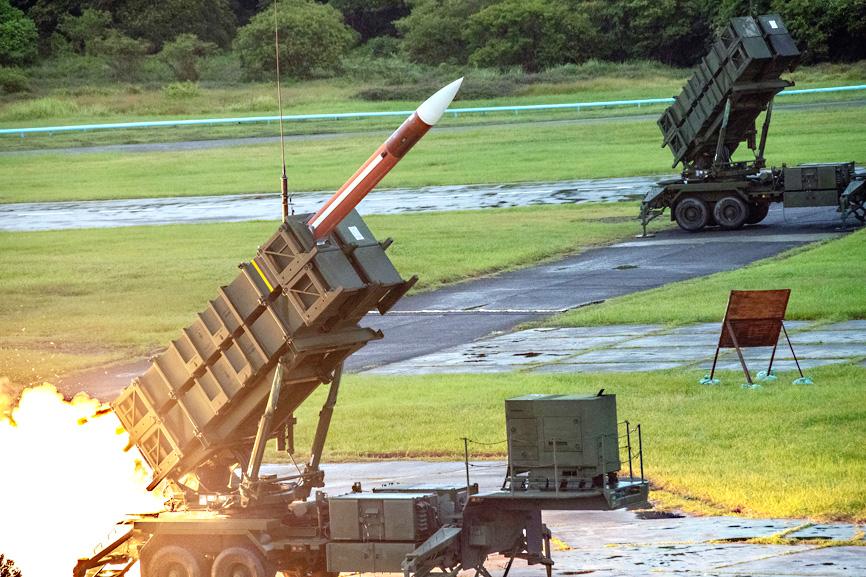The US on Tuesday announced that it has approved the sale of up to US$95 million of training and equipment to support Taiwan’s Patriot missile defense system, something Taipei said would help protect the nation from any invasion by China.
“The proposed sale will help to sustain [Taiwan’s] missile density and ensure readiness for air operations,” the Pentagon’s Defense Security Cooperation Agency said in a statement.
It added that Taiwan would use the proposed training and equipment as a “deterrent to regional threats and to strengthen homeland defense.”

Photo courtesy of Ministry of National Defense via CNA
The Ministry of Foreign Affairs welcomed the arms deal — the third approved by US President Joe Biden’s administration.
“In the face of China’s continuing military expansion and provocation, Taiwan must fully demonstrate its strong determination to defend itself,” the ministry said in a statement.
“Our government will continue to strengthen our self-defense and asymmetric combat capabilities,” it added.
The Ministry of National Defense said the deal is expected to take effect in one month.
The latest arms purchase comes as Taiwan closely watches the ongoing Russia-Ukraine war, as it also lives under the constant threat of an invasion by a giant neighbor.
The Chinese Ministry of Foreign Affairs yesterday condemned the deal, saying it “severely harms US-China relations, and the peace and stability of the Taiwan Strait.”
“China will take resolute and forceful measures to resolutely defend its own sovereignty and security interests,” ministry spokesman Zhao Lijian (趙立堅) said.
China has sanctioned US defense giants — including Boeing Defense, Lockheed Martin and Raytheon — for selling arms to Taiwan.
Beijing has ramped up its saber-rattling in recent years, sending 969 Chinese warplanes into Taiwan’s air defense identification zone last year, according to a database compiled by Agence France-Presse — more than double the roughly 380 in 2020.
Taiwan has recorded about 280 warplanes entering the zone this year.
Western powers, as well as regional neighbors Japan and South Korea, have looked on with growing alarm at Beijing’s designs on Taiwan under Chinese President Xi Jinping (習近平).
On Tuesday, Australia announced that it was accelerating plans to buy long-range missiles, citing new threats posed by Russia and China, including a potential invasion of Taiwan.
“There was a working assumption that an act of aggression by China toward Taiwan might take place in the 2040s. I think that timeline now has been dramatically compressed,” Australian Minister for Defence Peter Dutton told Seven Network television.
Washington has remained Taipei’s most important ally and leading arms supplier, despite switching diplomatic recognition to Beijing in 1979.
The Patriot is a highly mobile surface-to-air missile system that would be a crucial defense against Chinese warplanes.
Former US president Donald Trump ramped up big-ticket arms sales to Taiwan during his time in office as he feuded with Beijing on a host of issues from trade to national security.
Sales included drones, missile systems and new-generation fighter jets.

NATIONAL SECURITY THREAT: An official said that Guan Guan’s comments had gone beyond the threshold of free speech, as she advocated for the destruction of the ROC China-born media influencer Guan Guan’s (關關) residency permit has been revoked for repeatedly posting pro-China content that threatens national security, the National Immigration Agency said yesterday. Guan Guan has said many controversial things in her videos posted to Douyin (抖音), including “the red flag will soon be painted all over Taiwan” and “Taiwan is an inseparable part of China,” while expressing hope for expedited “reunification.” The agency received multiple reports alleging that Guan Guan had advocated for armed reunification last year. After investigating, the agency last month issued a notice requiring her to appear and account for her actions. Guan Guan appeared as required,

A strong cold air mass is expected to arrive tonight, bringing a change in weather and a drop in temperature, the Central Weather Administration (CWA) said. The coldest time would be early on Thursday morning, with temperatures in some areas dipping as low as 8°C, it said. Daytime highs yesterday were 22°C to 24°C in northern and eastern Taiwan, and about 25°C to 28°C in the central and southern regions, it said. However, nighttime lows would dip to about 15°C to 16°C in central and northern Taiwan as well as the northeast, and 17°C to 19°C elsewhere, it said. Tropical Storm Nokaen, currently

PAPERS, PLEASE: The gang exploited the high value of the passports, selling them at inflated prices to Chinese buyers, who would treat them as ‘invisibility cloaks’ The Yilan District Court has handed four members of a syndicate prison terms ranging from one year and two months to two years and two months for their involvement in a scheme to purchase Taiwanese passports and resell them abroad at a massive markup. A Chinese human smuggling syndicate purchased Taiwanese passports through local criminal networks, exploiting the passports’ visa-free travel privileges to turn a profit of more than 20 times the original price, the court said. Such criminal organizations enable people to impersonate Taiwanese when entering and exiting Taiwan and other countries, undermining social order and the credibility of the nation’s

‘SALAMI-SLICING’: Beijing’s ‘gray zone’ tactics around the Pratas Islands have been slowly intensifying, with the PLA testing Taiwan’s responses and limits, an expert said The Ministry of National Defense yesterday condemned an intrusion by a Chinese drone into the airspace of the Pratas Islands (Dongsha Islands, 東沙群島) as a serious disruption of regional peace. The ministry said it detected the Chinese surveillance and reconnaissance drone entering the southwestern parts of Taiwan’s air defense identification zone early yesterday, and it approached the Pratas Islands at 5:41am. The ministry said it immediately notified the garrison stationed in the area to enhance aerial surveillance and alert levels, and the drone was detected in the islands’ territorial airspace at 5:44am, maintaining an altitude outside the effective range of air-defense weaponry. Following